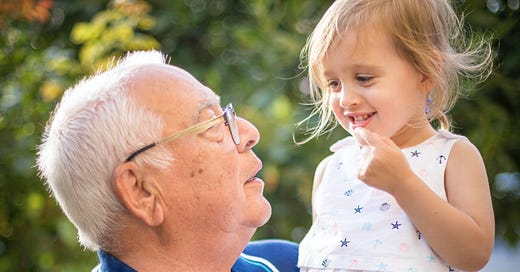Photo by Isaac Quesada on Unsplash
I have been a grandfather for more than ten years and I still don’t know what I’m doing. If there is a how-to manual on how to be a grandfather, it must still be at the printer because I haven’t seen it. And I’ve looked.
When I became a father, at least I had a role model to emulate. My father wasn’t perfect, but he taught me what I needed to know, showed me how to treat other people, gave me a firm moral compass, and showered love on me and my siblings as well as he knew how.
With the grandfather role, I was less fortunate. My one living grandfather was a hard man to get along with, much less to love. Paralyzed on one side by a stroke, he was rude, gruff, loud, impatient, and demanding. His temper flared often and unpredictably. Among other endearing habits, he liked to remove his dentures at the dinner table and place them in a water glass.
He did read me a book once, a memorable experience. It was the tale of a lonely woodcarver who created a wooden boy for companionship.
My grandfather read aloud, “‘I know!’ said Gepetto. ‘I will call him PiNOTCHio.’”
“It’s PinOKEEo,” I corrected him. I was well educated in the field of televised Walt Disney productions.
“PiNOTCHio!” said my grandfather sharply. “I’m reading and I say it’s PiNOTCHio. Do you want me to read it or not?”
I relented, because at that moment it was more important to be read to than to be right.
In fairness, my grandfather indirectly ignited the spark that became my future career. He lived with us for three years, and in his room he kept two fascinating artifacts: A black Royal typewriter, on which he occasionally blasted out letters to the editor, and Webster’s Unabridged Dictionary, a tome so huge that it had to rest in its own stand. My first attempts to put words to paper took place on that Royal typewriter, and if I was ever at a loss for a word I knew precisely where to look.
That aside, my grandfather’s example gave me little useful knowledge about being a good grandfather, other than providing a model to avoid.
Scarce Resources
There is ample material about grandmothers, and about grandparents generally. The grandfather is the forgotten man. One of the few people who has given their role serious thought is James S. Bates, a professor at Ohio State University. He contends that society’s expectations for men have evolved from the strong, silent Marlboro Man to a male with feelings and compassion. Grandfathers’ roles, he argues, similarly have been in flux. Bates proposed a conceptual framework he calls “nurturant grandfathering” and then had the decency to climb down from the ivory tower and publish a series of fact sheets with useful, practical ideas about specific roles grandfathers can play. Among them: Nurture and shape a grandchild’s character and personality traits, reinforce strong familial bonds by example, and teach grandchildren about their family history.
Two additional resources on grandfathering have popped up recently. Good Grandpa is a blog by Ted Page, a marketing consultant who noticed the dearth of advice for male grandparents. His blog tells stories from his and others’ experiences. There is also a podcast, Cool Grandpa, hosted by Greg Payne, an IT project manager. The podcast features interviews with grandfathers and subject matter experts.
When you turn to grandparenting generally, there are innumerable sources, from academic studies to websites. Two impress me the most. The Long-Distance Grandparent by my friend Kerry Byrne, a guest on The EndGame podcast last year, has tons of good advice that is both practical and research-based. She also curates a community of grandparents who share ideas with one another. The Grandparents Academy offers more than a dozen online courses on everything from cultivating values to the rights of alienated grandparents.
I have gathered many promising ideas from these resources. Providing a positive moral example appeals to me. So do sharing family history and helping to build a safe, secure family structure. While I work out in my head exactly how to do those things without being a pedant, a bore, or a grumpy old curmudgeon, I suppose I will keep grandfathering in the only ways I know how: Listening with my full attention, being silly whenever possible, and letting each grandchild know that I love them unconditionally – just because.
Has Your Transition Been Bumpy? Let’s Talk About It
I want to interview people about their own retirement experience for a book I’m researching. If you care to share your story, please email me at don@donakchin.com to set up a remote interview.





My question is what do you do as a great grandmother? My answer is to love her and appreciate every minute I have with her.
Always thoughtful (and an enjoyable read). Thank you!